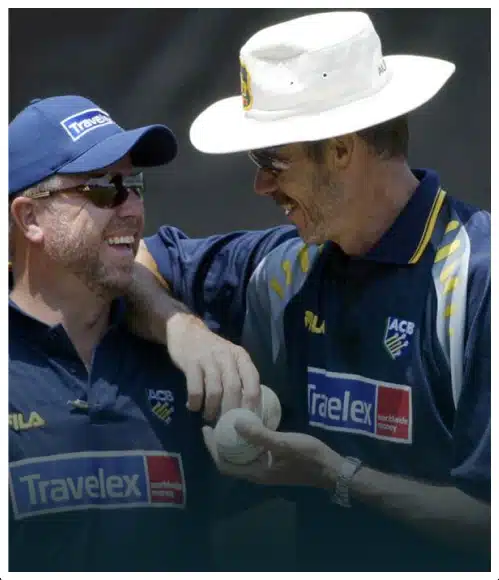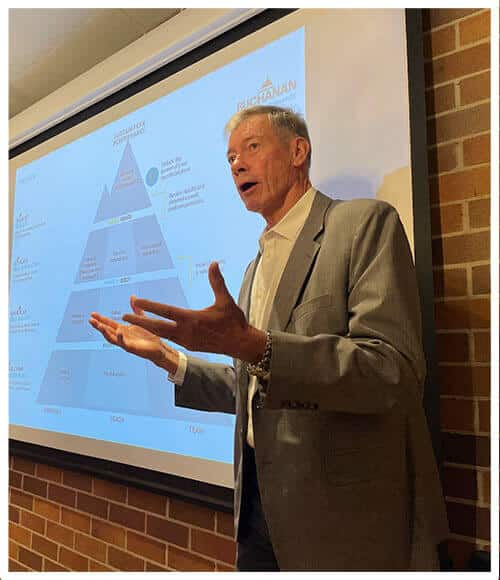As Leaders, managers, coaches – we are all faced with those difficult conversations…………the tough ones that neither the person giving, or the person receiving likes.
Dr Phil Jauncey is a performance psychologist, and a good friend. I have had him involved in a number of different projects with which I have been involved ranging from the Queensland Bulls, the Australian Cricket team, the big Brazilian mining company, Vale, to currently Morgans Financial Services.
My objective with each of these projects is to take the groups and individuals on their respective journeys to what I coin, ‘their Everest’.
Everest symbolises being on top of the world, on top of your game, dominant in your marketplace. There are no guarantees of not only climbing Everest, but also understanding how to remain there through planning, teamwork, risk taking, good decision making and so on.
Therefore using Everest as the symbol, I move teams from their current state of operation to a new peak performance state.
There are many factors which allow this to happen, or the flipside, there are obstacles which need to be overcome, in order to continue the climb to conquering Everest.
One of these areas is about the mental skills necessary for peak performance. A part of the mental skilling process, is the need to know how “I act”, but at the same time, knowing how those around me, and particularly as a leader, manager or coach, how staff and players, act.
And Phil Jauncey is the right man to deliver the messages and the action based approach. Here is a brief insight to this approach –
1. We all need a WHY –
Irrespective of our personalities, character and learning modes, in order to do something for ourselves or for the tam around us, there needs to be a fundamental purpose.
We have heard the saying, “you can lead a horse to water, but you can’t make them drink”. In other words, I can see the benefits to the person for completing a certain task, or to the team if the person completes a certain task to certain standards – but I have not found the right connection to this individual so that they ‘can see’ what I see.
So step 1 is making sure that individual knows what to do, how to do it and has the skills to do it, so that all remains is CHOICE….why should they choose to do it or not?
2. Accept Excuses –
If an individual chooses not to complete the task, then there is a reason(s), generally an excuse.
We can look at an excuse as a condition.
So the individual will offer an excuse or condition why they could not perform the task – accept this excuse or condition because we are interested in dealing with the future not the past. We can certainly learn from the past, and that is what we intend to do since we want to work with the individual to ‘fix’ their condition, so that it will not impede them in the future.
With a strategy to ‘fix’ the condition which is the obstacle to task completion, then there should be no reason into the future that non-completion of task will re-occur.
If it does, then we have a very legitimate question to ask, and that is, given that we agreed your condition (excuse) was the reason for non-completion; and given we have had a strategy to fix the condition – why are you unable to do what is required? Where do we go from here?
3. Make sure you do not ‘own the problem’ –
Often as leaders, managers, & coaches we allow the individual to not accept responsibility and accountability for their actions.
There should always be consequences good or bad that result from a person’s actions. Our job as leaders is to ensure that the consequences are administered constantly, consistently and with objectivity.
So conversations with those who choose to provide excuses or conditions to their performance will be based around –
• Accepting the excuse/condition
• Developing an agreed strategy to fix the condition
• Having natural consequences for actions taken
• The natural consequences are owned by the individual
4. Pain is Good –
Pain in any form (physical, emotional, psychological) is the body saying that something is not right, something is not working.
What is required is to clearly identify the source of the pain, so that a solution, a fix, can be made. The conversations need to allow the individual to discover or disclose these pain sources.
Commonly used terms is that “I am under stress”, or “I feel pressured”, or “I am really anxious”. Find the cause, fix the pain.
5. Deal in Specifics –
In order to be able to assist anyone; in order to be able to fix a problem, we must first clearly identify what it is in specifics.
So, “I am under stress”, “ this person lacks discipline”, “ that is poor behaviour”, “she is not a team player”……………are umbrella terms disguising what is actually happening.
So the conversations need to help the individual diagnose themselves what is causing the pain, or what may be identified as a shortcoming but what is the specific evidence.
6. Dealing with self-sabotage cases –
There are some people in teams and organisations who seem to ignore all these conversations and attempts to help.
For some, it will be a case of ‘self-dismissal’. That is to say, this type of individual is not prepared to accept accountability for their actions which are contrary to team norms, values and expectations.
The natural consequence for these people is that, “…..you are telling me, you do not want to accept the way it is around here, so given you have made this choice, then there is no alternative but to accept your resignation…….”
For some others though, it is not a case of not accepting the norms or expectations. In fact there is a lot to like about these people, it is just that it seems that they ‘self-sabotage’ at different times – they are often referred to as “…terrific person, but not very reliable….”
And of course the individual themselves knows this, but seems prone to making the same errors of judgment or action.
There is little doubt that they want to perform consistently; they do not want to feel pain; they want to be liked and be seen to be reliable.
These people need a definite plan, and then stick to it. Of course the plan should be based around the specific causes of their pain. These people may need some skilled help to get them to be able to confidently manage their futures.
Please message us your thoughts and comments!
Lead for World Class Performance— Join our Free Mini Course!







